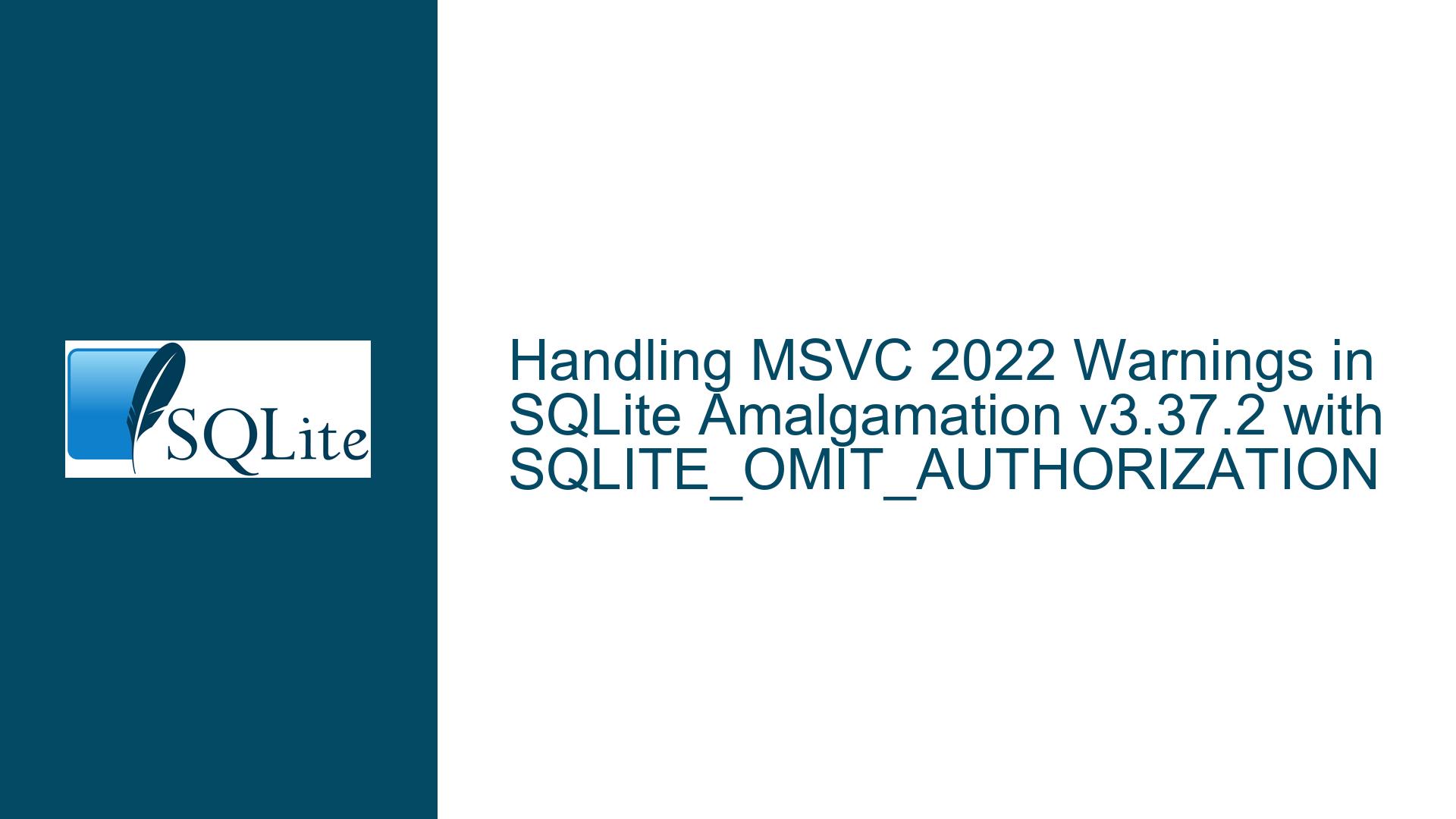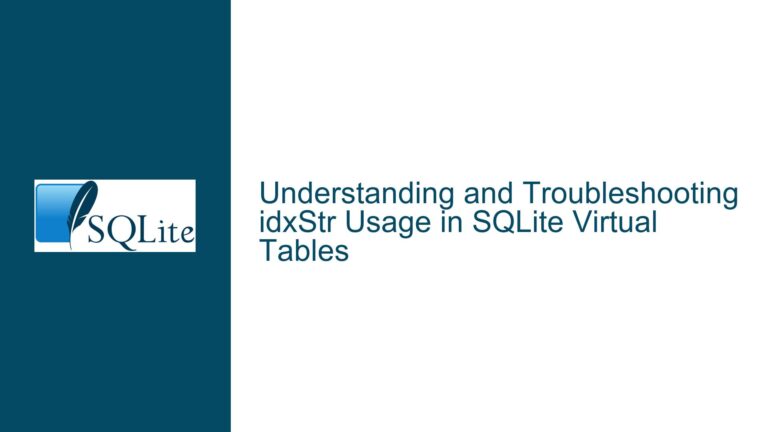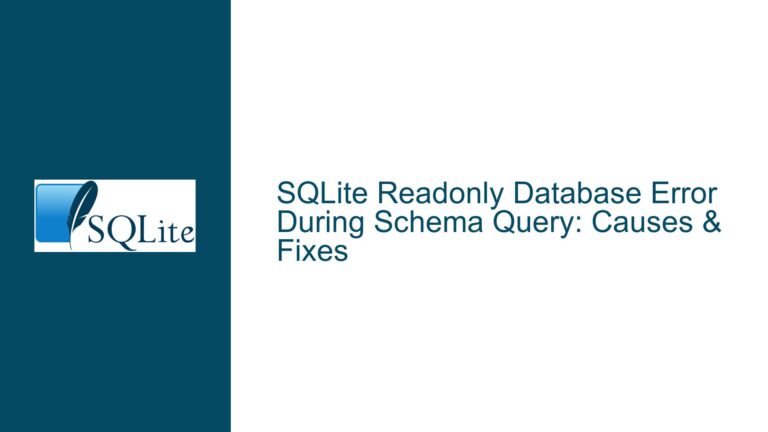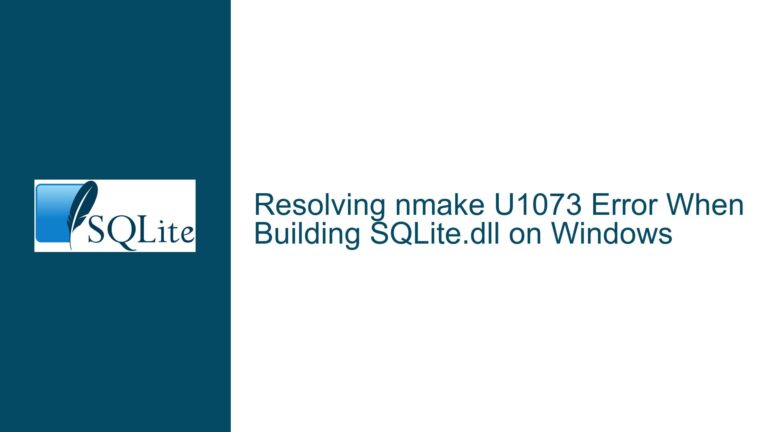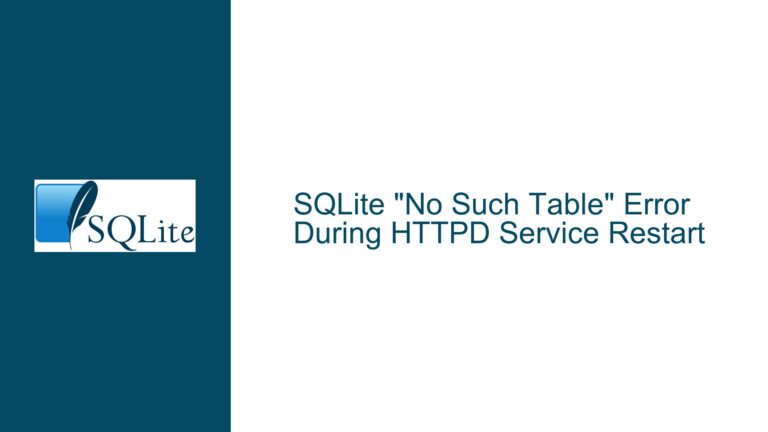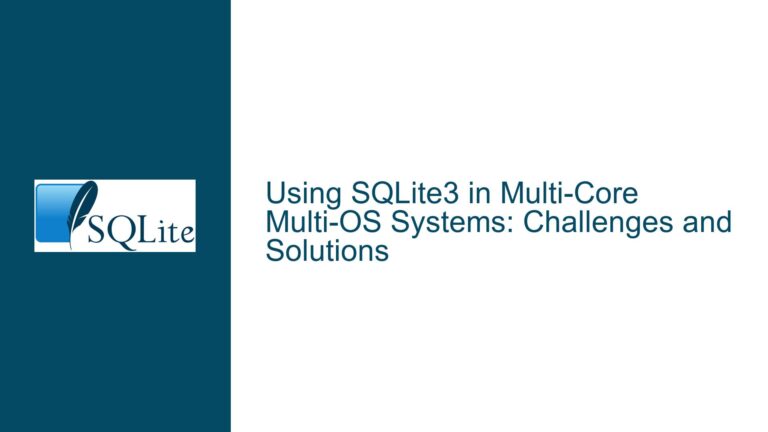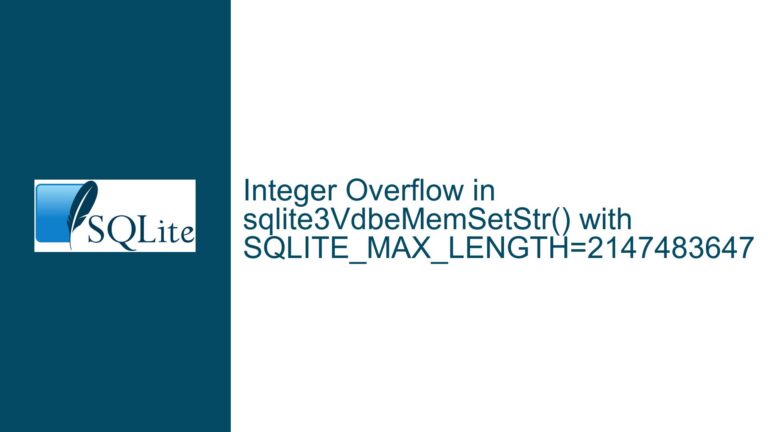Handling MSVC 2022 Warnings in SQLite Amalgamation v3.37.2 with SQLITE_OMIT_AUTHORIZATION
Issue Overview: MSVC 2022 Compiler Warnings in SQLite Amalgamation
When compiling the SQLite amalgamation version 3.37.2 using Microsoft Visual C++ (MSVC) 2022 (v17.0.6) with the SQLITE_OMIT_AUTHORIZATION compile-time option defined, several compiler warnings are generated. These warnings are primarily related to unused variables and deprecated functions. While these warnings do not directly impact the functionality or correctness of SQLite, they can be a source of concern for developers adhering to strict coding standards or those aiming for a clean compilation process. The warnings include:
- Unreferenced Local Variable (
rc): The variablercin thecodeAttach()function is declared but never used whenSQLITE_OMIT_AUTHORIZATIONis defined. - Deprecated
_ReadWriteBarrierFunction: The_ReadWriteBarrierintrinsic, used in thesqlite3MemoryBarrier()function, is deprecated in MSVC 2022. The compiler suggests using C++11 atomics or other intrinsics instead. - Unused Variables (
bRc,pTab,pTable): Several variables (bRc,pTab,pTable) are set but not used in specific functions, leading to compiler warnings.
These warnings are harmless in terms of runtime behavior but may indicate areas where the code could be optimized or modernized, especially in the context of evolving compiler standards and best practices.
Possible Causes: Why These Warnings Occur
The warnings arise due to a combination of factors, including the use of specific compile-time options, the evolution of compiler standards, and the inherent design of SQLite’s codebase. Below is a detailed breakdown of the causes:
Unreferenced Local Variable (
rc) incodeAttach():- The
rcvariable is declared within thecodeAttach()function but is only used when authorization checks are enabled (i.e., whenSQLITE_OMIT_AUTHORIZATIONis not defined). WhenSQLITE_OMIT_AUTHORIZATIONis defined, the authorization-related code is excluded, rendering thercvariable unused. This is a common pattern in SQLite’s codebase, where variables are conditionally used based on compile-time options.
- The
Deprecated
_ReadWriteBarrierinsqlite3MemoryBarrier():- The
_ReadWriteBarrierintrinsic is used in thesqlite3MemoryBarrier()function to enforce memory ordering in multi-threaded environments. However, MSVC 2022 has deprecated this intrinsic, recommending the use of C++11 atomics or other modern alternatives. SQLite, being a C library, cannot directly use C++11 atomics, creating a compatibility challenge.
- The
Unused Variables (
bRc,pTab,pTable):- These variables are declared and assigned values but are not subsequently used in their respective functions. This can happen due to conditional compilation, where certain code paths are excluded based on compile-time options, or due to legacy code that has evolved over time without thorough cleanup.
Impact of Compile-Time Options:
- SQLite provides numerous compile-time options (e.g.,
SQLITE_OMIT_AUTHORIZATION) to customize its behavior and reduce its footprint. While these options are powerful, they can lead to situations where variables or code paths become unused in specific configurations, triggering compiler warnings.
- SQLite provides numerous compile-time options (e.g.,
Compiler Evolution:
- Modern compilers like MSVC 2022 are increasingly strict about code quality and adherence to contemporary standards. Deprecation of older intrinsics (e.g.,
_ReadWriteBarrier) and stricter checks for unused variables are part of this trend. SQLite, being a mature codebase, occasionally encounters these issues when compiled with newer toolchains.
- Modern compilers like MSVC 2022 are increasingly strict about code quality and adherence to contemporary standards. Deprecation of older intrinsics (e.g.,
Troubleshooting Steps, Solutions & Fixes: Addressing the Warnings
To address the warnings, developers can take several approaches, ranging from simple code modifications to more comprehensive updates. Below are detailed steps and solutions for each warning:
1. Fixing the Unreferenced Local Variable (rc) in codeAttach()
The rc variable is declared but unused when SQLITE_OMIT_AUTHORIZATION is defined. To resolve this, the variable can be conditionally declared using preprocessor directives. Here are two possible solutions:
Solution A: Wrap the Declaration in #ifndef
#ifndef SQLITE_OMIT_AUTHORIZATION
int rc;
#endif
This ensures that the rc variable is only declared when authorization checks are enabled.
Solution B: Move the Declaration into the Authorization Block
#ifndef SQLITE_OMIT_AUTHORIZATION
if (ALWAYS(pAuthArg)) {
char *zAuthArg;
int rc;
// Authorization-related code
}
#endif
This approach moves the declaration of rc into the block where it is actually used, eliminating the warning.
2. Replacing the Deprecated _ReadWriteBarrier in sqlite3MemoryBarrier()
The _ReadWriteBarrier intrinsic is deprecated in MSVC 2022. Since SQLite is a C library and cannot use C++11 atomics, alternative approaches must be considered:
Solution A: Use _mm_mfence for x86/x64 Architectures
#include <intrin.h>
#define sqlite3MemoryBarrier() _mm_mfence()
The _mm_mfence intrinsic provides a memory barrier for x86/x64 architectures and is a suitable replacement for _ReadWriteBarrier.
Solution B: Use __sync_synchronize for GCC Compatibility
#if defined(_MSC_VER)
#define sqlite3MemoryBarrier() _mm_mfence()
#elif defined(__GNUC__)
#define sqlite3MemoryBarrier() __sync_synchronize()
#endif
This solution ensures compatibility with both MSVC and GCC.
Solution C: Use MemoryBarrier() for Windows API Compatibility
#include <windows.h>
#define sqlite3MemoryBarrier() MemoryBarrier()
The MemoryBarrier() function is part of the Windows API and provides a cross-platform memory barrier.
3. Addressing Unused Variables (bRc, pTab, pTable)
Unused variables can be addressed by either removing them or conditionally compiling them based on their usage. Here are specific solutions for each variable:
Variable bRc in sqlite3.c:31397:
- If
bRcis only used in specific configurations, wrap its declaration and usage in appropriate#ifdefdirectives. - Alternatively, remove the variable if it is no longer needed.
Variable pTab in sqlite3.c:108307:
- Similar to
bRc, wrap the declaration and usage ofpTabin#ifdefdirectives if it is conditionally used. - If the variable is entirely unnecessary, remove it.
Variable pTable in sqlite3.c:141636:
- Apply the same approach as above, using
#ifdefdirectives or removing the variable if it is unused.
4. General Best Practices for Handling Compile-Time Options
To minimize warnings and maintain code clarity, consider the following best practices:
- Use
#ifdefJudiciously: Wrap variables and code blocks in#ifdefdirectives to ensure they are only included when needed. - Regular Code Cleanup: Periodically review and remove unused variables and code paths, especially when adding or modifying compile-time options.
- Compiler-Specific Workarounds: Use preprocessor directives to handle compiler-specific issues, ensuring compatibility across different toolchains.
5. Long-Term Considerations
While the immediate fixes address the warnings, long-term considerations include:
- Deprecation of Legacy Intrinsics: As compilers evolve, SQLite may need to adopt modern alternatives for deprecated functions like
_ReadWriteBarrier. - Codebase Modernization: Regularly updating the codebase to align with contemporary standards can reduce the likelihood of similar issues in the future.
- Community Contributions: Encouraging contributions from the community can help identify and resolve such issues more quickly.
By following these steps and solutions, developers can address the MSVC 2022 warnings in SQLite amalgamation v3.37.2, ensuring a cleaner and more maintainable codebase.
